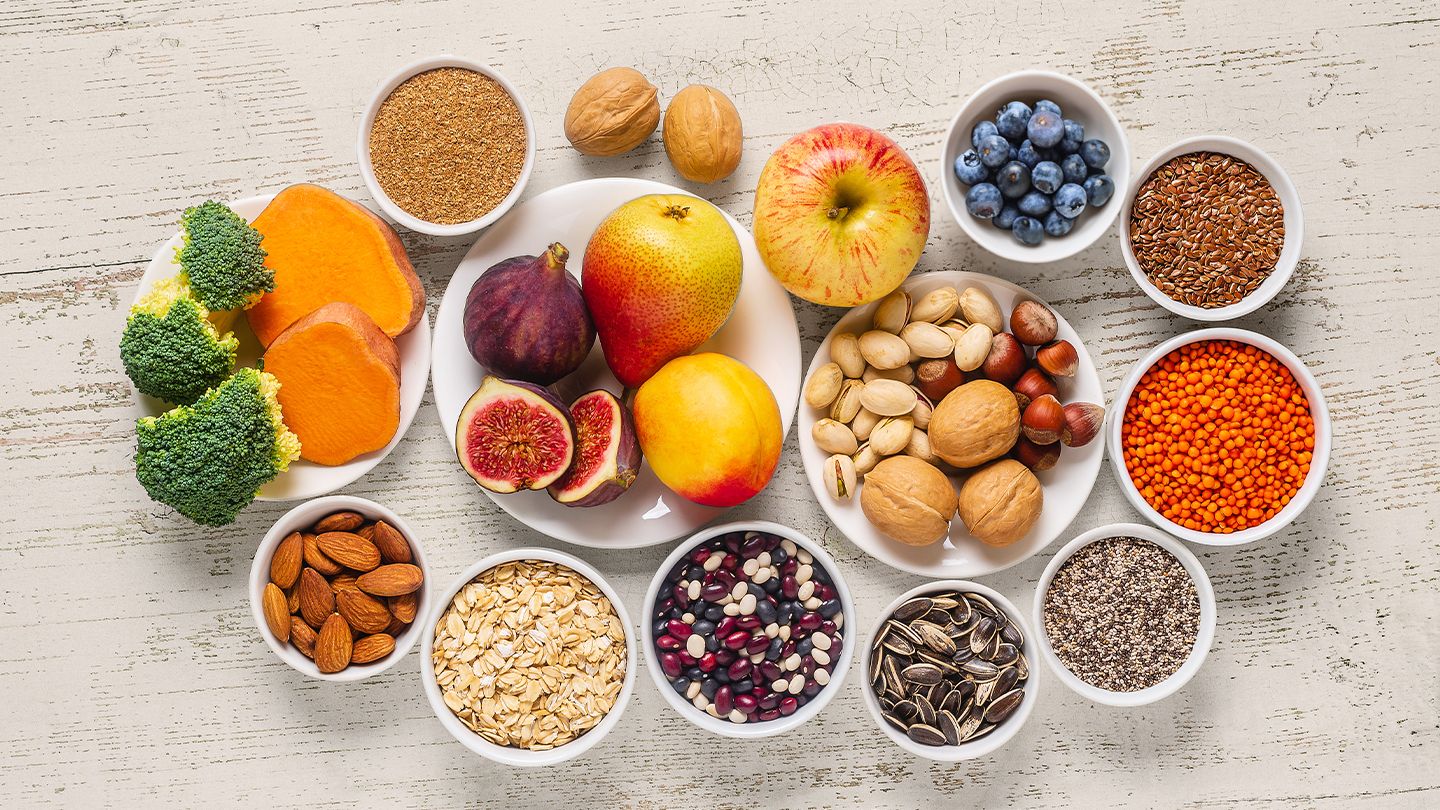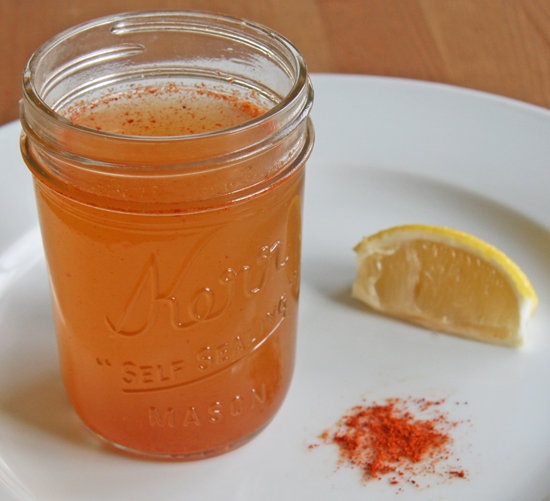Searching for foods that can combat inflammation and promote gut health? Look no further. This blog post is all about the power of fiber! Fiber, a complex carbohydrate found in plant-based foods, plays a critical role in maintaining a balanced gut microbiome. It aids digestion, prevents constipation, and feeds beneficial gut bacteria. But that’s not all. Did you know that fiber can reduce inflammation too? Yes, it’s true! Fiber-rich foods like fruits, vegetables, whole grains, legumes, and nuts can help lower inflammation and support immune function. So, are you ready to dig deeper into the wonders of fiber and its role in reducing inflammation and promoting gut health? Let’s get started!

Importance of Fiber for Gut Health
Undeniably, fiber is a potent ally when it comes to gut health. Its influence on gut health and inflammation reduction is backed by science. It all begins with the gut microbiota, a buzzing city of trillions of microorganisms, including bacteria, living in our intestines. These microscopic tenants play a big role in our health, and fiber is their favorite food.
Among the types of fiber, non-fermentable fibers are excellent for controlling blood sugar levels and adding bulk to stools, which aids in bowel regularity. Fermentable fibers, on the other hand, serve as prebiotics, nourishing the beneficial bacteria in our gut. They help improve the function of our intestinal barrier, which if compromised, can lead to inflammation and other health issues.
But the benefits of fiber don’t stop there. Fermentable fibers undergo a process of fermentation in the gut, producing short-chain fatty acids (SCFAs). These SCFAs have a direct role in reducing gut inflammation and supporting our immune function. Plus, many fiber-rich foods are packed with antioxidants, which help fight off harmful free radicals, further lowering inflammation and reducing the risk of chronic diseases.
When it comes to daily fiber intake, adults should aim for around 20-33 grams. It’s not just about the quantity, though. The quality matters too. Incorporating a variety of soluble and insoluble fibers into our diet can help us reap the full spectrum of fiber benefits. Wondering where to find these fibers? Fruits, vegetables, whole grains, legumes, nuts, and seeds are all fantastic sources.
Staying well-hydrated is another piece of the puzzle. Proper hydration enables soluble fibers to form a gel-like substance, easing the passage of stools and preventing constipation. So, drink up! Our blog post on hydration hacks can help you stay on track.
And let’s not forget about the importance of a balanced diet. Besides fiber, our gut health depends on a mix of vitamins, minerals, and other nutrients. For instance, the vitamin A in sweet potatoes is a boon for our gut health. So, remember to diversify your plate!
Fiber’s Role in Aiding Digestion
Delving into the capacities of fiber, we find it instrumental in facilitating smooth digestion. It combats constipation and ensures regularity in bowel movements. The types of fiber, soluble and insoluble, both play a part in this process. Soluble fibers, by absorbing water, soften stools. On the contrary, insoluble fibers add bulk to the stool, making it easier to pass.
Since some fibers are fermentable, they can be utilized by the gut microbiome. The resultant compounds not only fuel intestinal cells but make substantial contributions to the enhancement of gut function.
Fiber reducing inflammation and gut health are interrelated topics. The fermentation of fiber leads to the production of short-chain fatty acids. These compounds have been shown to reduce gut inflammation and bolster immune function. The additional antioxidants present in fiber-rich foods wage war against free radicals. This constant battle results in lowered inflammation, contributing to the reduction of chronic disease risk.
A daily fiber intake of 20-33 grams is considered beneficial for adults. Ideally, your diet should incorporate a mix of soluble and insoluble fibers. This variety ensures a full range of gut benefits, from enhanced bowel regularity to a reduced risk of colon cancer.
Including fiber in your diet is as simple as eating more fruits like apples and berries. Regular consumption of vegetables such as broccoli and sweet potatoes is beneficial too. Whole grains, legumes, and nuts and seeds are all fiber-rich options.
Hydration and fiber work hand in hand. Water aids soluble fibers in forming gels, which eases the passage of stools and prevents constipation. Regular intake of water, along with a fiber-rich diet, promotes healthy digestion and efficient gut function.
A balanced diet, rich in a variety of nutrients, is a boon for gut microbiota diversity. Besides fiber, vitamins and minerals play a role in maintaining gut health. For instance, vitamin A from sweet potatoes is particularly beneficial.
Multiple misconceptions surround fiber and gut health. For example, some believe that not all fibers are beneficial. This is incorrect. A variety of fiber sources is necessary as different gut bacteria prefer different fibers. A diet high in fiber diversity can contribute to a balanced gut microbiota, affecting gut and immune function positively.
How Fiber Reduces Inflammation
Exploring the connection between fiber and inflammation, several scientific studies reveal that fiber’s role in maintaining a healthy gut microbiota is paramount. In particular, fibers that undergo fermentation in the gut result in short-chain fatty acids. These compounds have been found to decrease inflammation in the gut and fortify the immune system.
Another mechanism through which fiber reduces inflammation is through the antioxidants present in fiber-rich food. These antioxidants combat free radicals, thereby reducing inflammation and the risk of chronic diseases.
To effectively tap into the benefits of fiber reducing inflammation and gut health, consider these five steps:
-
Consume a variety of fiber sources: Different fibers have distinct health benefits. For example, fermentable fibers act as prebiotics and aid in gut health.
-
Aim for at least 20-33 grams of fiber daily: This ensures that you reap the benefits of both soluble and insoluble fibers.
-
Stay hydrated: Water works in tandem with fiber, especially soluble fiber, to prevent constipation and promote a healthy gut.
-
Maintain a balanced diet: Other nutrients, such as vitamins and minerals, are critical for a healthy gut microbiota.
-
Dispel common misconceptions: All types of fiber are beneficial for gut health. A diet with a variety of fiber sources can lead to a balanced gut microbiota.
For more practical tips on how to increase fiber intake and promote a healthier gut, check out our list of testosterone- boosting foods, many of which are rich in fiber.
In a nutshell, fiber’s role in reducing inflammation and promoting gut health lies in its impact on the gut microbiota. Through the fermentation process and the presence of antioxidants in fiber-rich food, inflammation is reduced, and gut health is improved.
The Science Behind Fiber and Inflammation Reduction
Let’s dig deeper into how fiber can help reduce inflammation and promote gut health. When fiber enters your digestive system, it interacts with your gut bacteria in a process called fermentation. This process results in the production of short-chain fatty acids, powerful compounds that can reduce inflammation and support immune function.
The beneficial gut bacteria that ferment the fiber thrive, leading to a healthier gut microbiota. Plus, an added bonus is that many fiber-rich foods are loaded with antioxidants that are known to combat free radicals. This helps to further lower inflammation and reduce the risk of chronic diseases.
Why does this matter? Well, chronic inflammation is linked to a variety of health problems, including heart disease, diabetes, and certain types of cancer. So, eating a diet rich in fiber can be a simple yet effective way to keep inflammation in check and promote better gut health.
But what if you’re not getting enough fiber in your diet? Fear not! There are plenty of ways to up your fiber intake. You can start by adding more fruits, vegetables, whole grains, legumes, nuts, and seeds to your meals.
And don’t forget to drink plenty of water! Hydration is critical for fiber to function effectively, helping it form gels and ease the passage of stool, thereby preventing constipation.
In our nutrition category, we provide practical tips on how to incorporate more fiber-rich foods into your diet. So, it’s worth a look if you’re serious about improving your gut health.
In summary, fiber’s role in reducing inflammation and promoting gut health is undeniable. Its interaction with our gut bacteria, the production of short-chain fatty acids, and the presence of antioxidants in fiber-rich foods all contribute to a healthier, happier gut.
Daily Fiber Intake: How Much Do We Really Need?
The question of how much fiber we need daily is often on the lips of health enthusiasts. For adults, a daily fiber intake of 20-33 grams is advised. This balance of soluble and insoluble fibers fuels gut health and offers other body benefits. A diet rich in fiber has been linked to a reduced risk of colon cancer and promotes bowel regularity.
To meet this daily fiber requirement, consider adding a variety of high-fiber foods to your meals. These include fruits like apples and berries, vegetables such as broccoli and sweet potatoes, and whole grains like oats and brown rice. Don’t overlook legumes, beans, lentils, nuts, and seeds like chia seeds and almonds, which are fiber goldmines.
Hydration is a close ally of fiber in promoting gut health. Drinking enough water helps soluble fibers form a gel-like substance that aids in easier passage of stools, warding off constipation. So, keep your water bottle close, it’s your fiber’s best friend!
Beyond fiber, your gut health thrives on a balanced diet of other nutrients. Vitamins like Vitamin A from sweet potatoes and minerals contribute to the well-being of your gut. Antioxidant-rich foods provide an extra layer of protection to your gut cells.
Dispelling myths about the intake of fiber is critical. Contrary to some beliefs, all fibers bring benefits to the table. Different gut bacteria have a preference for different fibers. A diet lacking fiber diversity can throw your gut microbiota off balance, affecting your gut and immune function.
Real-life examples abound of how fiber has improved gut health. Studies reveal that an increase in fiber intake can drastically improve the composition of gut microbiota. For example, a diet high in fiber from fruits and vegetables has been linked to better gut flora diversity. This has been found to reduce symptoms of conditions such as irritable bowel syndrome (IBS). So, it’s high time you embraced fiber in your diet, your gut will thank you!

Optimal Fiber Intake for Adults
In the pursuit of maintaining a healthy gut, adults should aim to consume between 20 to 33 grams of fiber per day. This daily dose should be a healthy mix of both soluble and insoluble fibers. Why? By doing this, you’re giving your gut and your entire body a whole range of benefits. Fiber reducing inflammation and gut health isn’t an urban legend – it’s science-backed fact.
High-fiber diets are associated with lower risk of colon cancer. It’s like having an army of microscopic soldiers guarding your gut against harmful invaders. But that’s not all. Regular bowel movements are a perk of sufficient fiber intake, keeping constipation at bay. To put it plainly, fiber keeps things moving in your digestive tract.
But how can you incorporate fiber into your everyday meals? It’s easier than you might think. Fruits such as apples and berries, vegetables like broccoli and sweet potatoes, whole grains, legumes, and nuts and seeds are all high in fiber. These foods are like tiny superheroes, each with their own set of superpowers to fight inflammation and promote gut health.
Hydration is another critical aspect of the fiber equation. Think of water as fiber’s best friend. It helps soluble fibers form a gel-like substance, which eases the passage of stool and prevents constipation. So, a glass of water isn’t just quenching your thirst – it’s giving fiber a helping hand.
Now, you might be thinking, “Is fiber the only thing my gut needs?” The answer is no. A balanced diet rich in vitamins, like the vitamin A found in sweet potatoes, and minerals, plays a critical role in maintaining gut functions. These nutrients are like the support staff, working behind the scenes to keep your gut happy and healthy.
In the end, the more varied your fiber sources, the happier your gut microbiota will be. Different types of gut bacteria prefer different types of fiber. So, go ahead and mix things up. Your gut will thank you for it. Remember, fiber isn’t just about reducing inflammation and promoting gut health – it’s a way of life.
Incorporating More Fiber into Your Diet
As you navigate the path to better gut health, adding more fiber to your meals is a top priority. Fiber is a superhero in the nutritional universe, playing a pivotal role in reducing inflammation and promoting gut health. Its benefits are as varied as the foods it can be found in.
From fruits like apples and berries to vegetables such as broccoli and sweet potatoes, fiber is bountiful in many foods. Whole grains, legumes, nuts, and seeds all pack a powerful fiber punch. Including a mix of these in your daily diet can help you meet the recommended 20-33 grams of fiber for adults.
But don’t stop at just these. The more varied your fiber sources, the better. Each type of fiber has its own set of health benefits, and different gut bacteria prefer different types. So, keeping a wide array of fiber-packed foods on your plate can lead to a more balanced gut microbiota.
Hydration is another critical factor to consider. Water and fiber work hand in hand to promote smooth digestion. It’s like a well-choreographed dance, where water helps soluble fibers form a gel-like substance. This not only eases the passage of stool but prevents constipation as well.
Of course, it’s not all about fiber. Other nutrients play a critical role in maintaining gut health. Vitamins and minerals, like those found in sweet potatoes, are just as necessary. They’re the supporting cast to fiber’s leading role, working behind the scenes to keep your gut in top form.
Incorporating these insights into your daily diet can help you take a big leap forward in promoting gut health and reducing inflammation. So, don’t just eat, fuel your body with the right nutrients. After all, when it comes to health, it’s always better to be proactive than reactive.

5 High-Fiber Foods to Include in Your Diet
To maintain a healthy gut and lower inflammation, including high-fiber foods in your meals is a smart move. Here are five foods rich in fiber that you might want to invite to your dining table more often:
-
Fruits – Bite into an apple or savor some berries. These fiber champions not only satisfy your sweet tooth but are beneficial to your gut health.
-
Vegetables – A serving of broccoli or sweet potatoes can help you reach your daily fiber goal.
-
Whole grains – Opt for oats or brown rice instead of refined grains to get a fiber hit.
-
Legumes – Beans and lentils are not only high in protein but fiber too.
-
Nuts and seeds – Snack on some chia seeds or almonds to keep your gut happy.
Remember, fiber is a friend to your gut microbiota, offering health benefits such as aiding digestion, reducing inflammation, and promoting gut microbial diversity. A Western diet high in these fiber sources can do wonders for your gut and general health.
It’s worth highlighting, though, that fiber works best when paired with adequate hydration. So, don’t forget to drink enough water to assist the fiber in doing its job. Plus, including other nutrients, like those from purple sweet potatoes, into your diet will further support your gut health.
Contrary to some misconceptions, all types of fiber contribute positively to your gut. A variety of fiber sources is best as different gut bacteria have different fiber preferences. So, diversify your fiber intake for a balanced gut microbiota.
In a nutshell, fiber is a quiet game-changer in maintaining gut health. So, whether it’s an apple a day or a bowl of oats, make sure you’re feeding your gut the fiber it craves. After all, a happy gut equals a healthy you!
Can Drinking Water Enhance Fiber’s Benefits?
Let’s consider whether sipping water could potentially amplify the effects of fiber, particularly in reducing inflammation and promoting gut health. As we all know, fiber is a champ when it comes to aiding digestion and bolstering gut health. But water? It’s the unheralded sidekick that makes fiber’s job easier.
Drinking enough water is tantamount to letting fiber perform at its best. You see, soluble fibers need water to form a gel-like substance. This substance is what makes your stool soft and easy to pass. So, if you’re not drinking enough water, you might find yourself in a bit of a bind, pardon the pun.
But there’s more to it than just easing constipation. Proper hydration can further optimize the health benefits of fiber. When you drink water, it helps transport nutrients — including fiber — throughout your body. This could mean more efficient delivery of fiber to your gut, potentially improving gut microbial balance and reducing inflammation.
In a similar vein, water can help dissolve waste products in the body, making it easier for fiber to sweep them out. This not only helps with detoxification but may support a healthier gut environment. So, not only does water make fiber more effective, but it could potentially amplify its benefits.
So, next time you chow down on high-fiber foods like apples, broccoli, or sweet potatoes, remember to have a glass of water on hand. Not only will it help quench your thirst, but it may just give your gut health a little extra nudge in the right direction.
In the grand scheme of things, drinking water is a simple and easy way to support the role fiber plays in reducing inflammation and promoting gut health. So, here’s to hydration – the unsung hero in your crusade for better gut health! And remember, fiber is not picky – it works just as well with a plain old glass of water as it does with a cup of tea or even your morning coffee.
The Connection between Hydration and Fiber
Exploring the synergy of water and fiber provides fascinating insights into gut health. Proper hydration is the secret to unlocking fiber’s full potential. Consuming enough water allows soluble fibers to form a gel-like substance, easing the passage of stool and preventing constipation. Hence, drinking water is a necessary companion to fiber intake in promoting efficient digestion.
Let’s take a closer look at how water elevates fiber’s impact on the gut. Water assists fiber in its mission to cleanse your system, helping to dissolve waste products. This process not only supports detoxification but may create a healthier gut environment. In essence, water amplifies the benefits of fiber, making it more effective in its role.
Remember, whenever you’re enjoying fiber-rich foods like crunchy apples, leafy broccoli, or hearty sweet potatoes, pair them with a glass of water. This simple act can give your gut health a beneficial push.
In the grand scheme of things, the role of water in supporting fiber’s function in reducing inflammation and promoting gut health is often overlooked. Hydration is the quiet hero in your battle for a healthier gut. And don’t worry, fiber isn’t fussy. It works just as well with your morning cup of coffee or tea as it does with a plain glass of water.
Fiber reducing inflammation and gut health is a critical concept to grasp. But remember, it’s only part of the picture. Hydration is the other piece of the puzzle. By maintaining proper hydration, you can help fiber do its job more efficiently, leading to a happier and healthier gut.
In summary, don’t underestimate the importance of hydration when focusing on fiber intake for gut health. So, raise a glass to hydration, the unsung hero supporting fiber in promoting a healthier gut. After all, fiber and water are a match made in gut health heaven.
The Importance of a Balanced Diet for Gut Health
In the pursuit of gut health, the significance of a well-rounded diet cannot be overstated. It’s not just about what you eat, but the balance and diversity of nutrients in your meals. One star player in the diet-gut health connection is fiber. Why? Well, fiber reducing inflammation and gut health improvements go hand in hand.
Fiber, found in plant-based foods, performs a dual role. Non-fermentable fibers bulk up your stools, helping to control blood sugar levels. On the other hand, fermentable fibers act as prebiotics. They feed the good bacteria in your gut, improving the function of the intestinal barrier, and reducing inflammation.
Now, how does fiber aid digestion? Simple! It helps prevent constipation and promotes regular bowel movements. Soluble fibers absorb water and soften the stools, making them easier to pass. Insoluble fibers add bulk to your diet, which helps in preventing constipation. Some fibers get fermented by your gut microbiome, resulting in compounds that fuel your intestinal cells and improve gut function.
What’s more, fiber is a natural inflammation-fighter. It promotes a healthy gut microbiota, which in turn reduces inflammation. Fermented fibers produce short-chain fatty acids that lower inflammation in the gut and give your immune system a helping hand.
So, how much fiber do you need per day? Aim for 20-33 grams. It’s beneficial to consume a mix of soluble and insoluble fibers for maximum gut health benefits. A high-fiber diet is linked to a lower risk of colon cancer and improved bowel regularity.
To increase your fiber intake, include foods like fruits, vegetables, whole grains, legumes, nuts, and seeds in your diet. But the magic of fiber doesn’t stop there. Hydration is an unsung hero that enhances the benefits of fiber. Drinking enough water helps soluble fibers form gels, aiding stool passage and preventing constipation.
But, wait! We’re not done yet. Besides fiber, other nutrients play a pivotal role in maintaining gut health. Vitamins and minerals, like vitamin A from sweet potatoes, contribute to maintaining gut and body function. Plus, the antioxidants in foods shield gut cells from damage.
Now, let’s debunk some myths about fiber. Contrary to popular beliefs, all fibers are beneficial. A diet with a variety of fiber sources is needed for a balanced gut microbiota. Lack of fiber diversity can lead to an imbalanced gut microbiota, affecting gut and immune function.
In the grand scheme of things, increasing fiber intake can greatly improve gut microbiota composition. A diet high in fiber from fruits and vegetables has been linked to better gut flora diversity and reduced symptoms of conditions like irritable bowel syndrome (IBS).
So there you have it, folks! Balancing your diet with the right amount of fiber and other nutrients is a simple yet powerful way to upkeep your gut health. So, eat your veggies, keep yourself hydrated, and let fiber do its magic!
Other Nutrients Crucial for Gut Health
So, what are some other essentials that your gut health thrives on, beyond fiber? Well, a colorful plate filled with a variety of nutrients is akin to a party for your gut microbiota. Vitamins and minerals are the life of this party, keeping your gut and whole body functioning smoothly.
Consider Vitamin A as the DJ, setting the mood and making everything run smoothly – and guess what? You can find it in the much-loved purple sweet potato!
Now, let’s not forget about the bouncers of this party – the antioxidants. They protect your gut cells from the unwanted party crashers (free radicals), keeping the peace and preventing chaos (or damage).
Remember, a balanced diet doesn’t mean you need to eat every nutrient at every meal. It’s more about maintaining a good balance over time. So, don’t sweat the small stuff, just focus on eating a variety of nutrient-rich foods every day.
But wait, there’s more! You can’t have a party without some hydration, right? Water is like the unsung hero at the gut health party. It teams up with soluble fibers to form a gel-like substance, making it easier for stools to pass and preventing constipation.
So, keep that water bottle handy and make hydration a habit. Your gut will thank you for it!
In a nutshell, fiber is a superstar when it comes to reducing inflammation and promoting gut health. But it’s not a one-man show. Other nutrients, hydration, and a balanced diet all play supporting roles in maintaining a healthy gut.
To put it simply, a healthy gut is a team effort. So, let’s give a round of applause to fiber, vitamins, minerals, and hydration – the unsung heroes of gut health!
So, just remember, for a happy gut, eat a variety of foods, stay hydrated, and of course, don’t forget to party on with your fiber!
Common Misconceptions about Fiber and Gut Health
There’s a prevailing misunderstanding circling around fiber and its relationship with gut health. Many people get tangled up in the myth that our bodies need only one type of fiber. In truth, diversity in our fiber intake is paramount. The more varied our fiber sources, the better for our gut microbiota. Just like us, these tiny gut critters have preferences; some might enjoy nibbling on soluble fibers from oats, others may prefer the insoluble fibers found in whole grains.
So, if our diet lacks a mix of fiber types, we risk throwing our gut bacteria off balance. This imbalance can adversely affect the gut’s barrier function and immune system. Here’s a simple way to think about it: a good party thrives on a variety of guests, and your gut is no different. It likes to host a wide array of fiber-loving bacteria to keep things lively and healthy.
Another misbelief is that fiber only serves to bulk up our stools. Granted, it does play that role, but the benefits of fiber go way beyond that. It’s like the quarterback of our gut health, leading the charge to reduce inflammation, regulate blood sugar levels, and improve digestive health.
So, next time you hear someone downplaying the importance of fiber variety, feel free to set the record straight. Don’t let these common misconceptions about fiber reducing inflammation and gut health steer you or anyone else down the wrong dietary path. Remember, when it comes to fiber, variety is truly the spice of life… and gut health!
And here’s a nugget of wisdom: if you want to score a touchdown in the gut health game, don’t overlook the hydration factor. Pair your high-fiber diet with plenty of water, and you’ve got a winning strategy for promoting top-notch gut health.
In short, diversify your fiber sources and stay well-hydrated. Your gut will thank you for it.
Debunking Myths about Fiber Intake
Let’s break down some misconceptions about fiber consumption. It’s a common myth that not all fibers are beneficial. But the truth is, each type of fiber feeds a different set of bacteria in the gut. So, giving your gut a variety of fibers from different sources is as critical as the fiber intake itself.
Neglecting to diversify your fiber sources can cause an imbalance in your gut microbiota. This can negatively impact your gut health, and even your immune function. So, remember, variety is the name of the game when it comes to fiber intake.
Many people are under the impression that high-fiber diets are a one-way ticket to digestive discomfort. In reality, our guts tend to adjust to increased fiber consumption over time. So, if you’re planning to up your fiber intake, it’s a good idea to do it gradually.
Another misleading notion is that fiber only functions to keep us regular. Yes, fiber does aid in regular bowel movements. But that’s not all it does. Consuming enough fiber, especially fermentable fiber, can lead to a reduction in gut inflammation. It can even contribute to improved immune function.
A myth that’s been floating around for a long time is that hydration doesn’t affect the benefits of fiber. That’s simply not true. Drinking enough water is very critical when you’re consuming a high-fiber diet. When soluble fibers absorb water, they can form a gel-like substance. This eases the passage of stool and prevents constipation.
And lastly, some people believe that fiber supplements can replace dietary fiber. The fact is that dietary fiber offers an array of benefits beyond gut health. It includes nutrients and antioxidants that a supplement just can’t provide. Hence, getting your fiber from whole foods is the best way to go.
In a nutshell, don’t believe everything you hear about fiber reducing inflammation and gut health. Always remember, a diet rich in a variety of fibers, coupled with good hydration, can do wonders for your gut and your health in general.
Real-Life Examples: How Fiber Improved Gut Health
Let’s peer into the lives of those who’ve reaped the benefits of fiber reducing inflammation and gut health. It’s like opening a window into the lives of others, seeing firsthand how this simple dietary change can make a huge difference.
In one study, individuals with Irritable Bowel Syndrome (IBS) reported a noticeable reduction in symptoms after increasing their intake of fiber-rich foods, such as fruits and vegetables. The participants’ gut microbiota composition showed marked improvement, with increased diversity and healthier gut flora.
In another case, a middle-aged man suffering from chronic constipation found relief after adding more fiber to his diet. Whole grains, legumes, and nuts became his go-to foods. Not only did his bowel movements become regular, but he felt lighter and more energetic.
A woman combating high blood sugar levels decided to incorporate more non-fermentable fibers into her diet. These fibers, known to regulate blood sugar, proved to be a game-changer. Her blood sugar levels stabilized, and she felt healthier than she’d been in years.
These are just a few instances showing the impact fiber can have on gut health. It’s like turning a new leaf, watching these individuals regain control of their health, thanks to the humble fiber. Don’t forget, staying hydrated is part of the package too. Just like a plant needs water to absorb nutrients from the soil, your body needs water to make the most of fiber’s benefits.
Incorporating fiber into your diet isn’t rocket science. It’s as easy as choosing an apple over a bag of chips, or swapping white bread for whole grain. Small changes can make a big difference. It’s about making conscious choices, for a healthier, happier gut.
In the grand scheme of things, fiber’s role in reducing inflammation and promoting gut health is undeniable. And these real-life examples are a testimony to that. So why not give it a try? After all, your gut health is worth it!
Case Study: Increasing Fiber Intake for Better Gut Health
Building on the principles of the gut microbiota, let’s take a closer look at a case where fiber intake directly improved gut health.
In this study, an individual suffering from gut-related issues decided to up their fiber game. The results were nothing short of remarkable. With a diet heavy on purple sweet potatoes, fruits, and whole grains, their bowel movements became regular. Their gut microbiome diversity improved, and symptoms of irritable bowel syndrome (IBS) decreased.
Just like a winning team, our gut needs diversity. The gut bacterial microbiota thrives on different types of fiber. The more varied your fiber intake, the happier your gut. One might think of it as a musical ensemble, where each instrument adds a distinct note, creating a beautiful, balanced symphony.
The subject of the case study achieved this balance by consuming a variety of fiber-rich foods. They didn’t just stick to their purple sweet potatoes. They added apples, broccoli, brown rice, beans, lentils, and almonds to their menu.
That’s not all. Hydration played a major role in their gut health transformation. They made sure to drink plenty of water, aiding the fiber in doing its magic. Remember, hydration is the conductor that orchestrates smooth digestion and enhanced gut microbial function.
This example not only showcases the magic of fiber but it’s a reminder that everything counts when it comes to gut health. A balanced diet, sufficient hydration, and a variety of fiber-rich foods all contribute to a healthier gut microbiota.
In the end, the case study subject became a walking PMC article! They are proof that the right diet can change your life. They took control, took the bull by the horns, and transformed their gut health. Let’s take a leaf out of their book. After all, we all want our gut to sing a happy tune, don’t we?
Fiber reducing inflammation and gut health. These words aren’t just a buzz; they are a lifestyle. And as the case study shows, it’s achievable. With the right diet and a little effort, we can all hit the high notes of gut health.

Subscribe To Our VIP Newsletter
Join our VIP mailing list to receive additional content that goes even deeper into the latest tips to ensure you and your families health, fitness and wellness.























